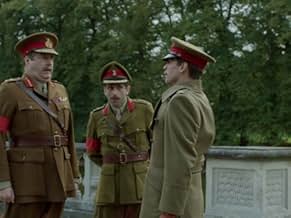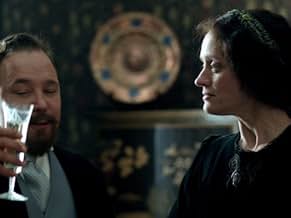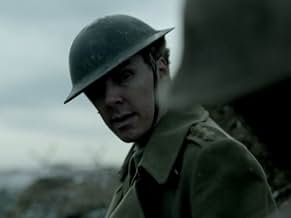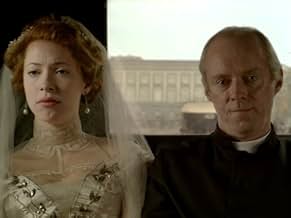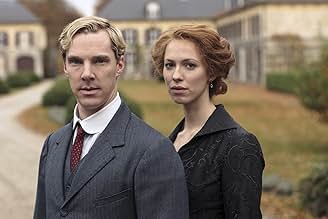Dreht sich um eine Dreiecksbeziehung zwischen einem konservativen englischen Aristokraten, seiner gemeinen Frau und einer jungen Suffragette.Dreht sich um eine Dreiecksbeziehung zwischen einem konservativen englischen Aristokraten, seiner gemeinen Frau und einer jungen Suffragette.Dreht sich um eine Dreiecksbeziehung zwischen einem konservativen englischen Aristokraten, seiner gemeinen Frau und einer jungen Suffragette.
- Für 5 Primetime Emmys nominiert
- 8 Gewinne & 36 Nominierungen insgesamt
Folgen durchsuchen
Empfohlene Bewertungen
I had mixed feelings when I started watching the BBC drama. Having read some comments I had some fears. One of them was that I expected the series to be some kind of copy-paste of Downton Abbey. It wasn't. It is more subtle, evolves more slowly and has an almost inaudible air of pain and suffering. I couldn't help but compare it to Maughem's "The Painted Veil" that tells the story of a couple - a flippant wife of a doctor who is intellectually superior to her but too noble and and at the same time too proud to divorce her for betrayal. This story might seem similar however it has a greater depth. It's not only a man's parade trying to stand for what he truly believes in and finding himself abandoned by life and failing as a man. It's a vivid portrayal of virtues that are believed to be outdated but are in fact so modern and thoroughly relevant to today. And that's what salvages these series from being just another costume drama.
What surprised me most about the drama was Benedict Cumberbatch's performance. He has an incredible acting prowess to play roles that are so different from him. There is no Benedict neither in Sherlock nor in Mr Tiejens. He completely vanishes within the characters he plays altering his movements, speaking, laughing, joking etc. It's interesting to note what Benedict said speaking about the role "Christopher has many admirable qualities I'd like to siphon off into my life."
I believe Mr Tiejens is one of Benedict's best roles. He uses his voice like an instrument tuning it sometimes so deep and strong and sometimes subtle and gentle. It's an astonishing performance that definitely transcends TV dramas.
What surprised me most about the drama was Benedict Cumberbatch's performance. He has an incredible acting prowess to play roles that are so different from him. There is no Benedict neither in Sherlock nor in Mr Tiejens. He completely vanishes within the characters he plays altering his movements, speaking, laughing, joking etc. It's interesting to note what Benedict said speaking about the role "Christopher has many admirable qualities I'd like to siphon off into my life."
I believe Mr Tiejens is one of Benedict's best roles. He uses his voice like an instrument tuning it sometimes so deep and strong and sometimes subtle and gentle. It's an astonishing performance that definitely transcends TV dramas.
I'm sure that HBO marketing execs were relieved that, if they were going to get behind a 5-part series based on Ford Madox Ford's complex and not terribly well known 20th-century masterpiece, at least some of it would be set in a stately home in the north of England, like that other show about the downtown abbey.
Ford's a great one for interior monologue and multiple points of view and such, but Tom Stoppard's masterly adaptation channels the great muddy river of his prose into a lively, involving narrative—though there's still enough time-shifting and flashbacking, even some Eisenstein-style montage, to do honor to Ford's avant-garde intentions. Considering what difficult material he's dealing with, it's one of the best TV adaptations ever!
Benedict Cumberbatch has always done well in period films, and he seems like the only possible choice for Christopher Tietjens, a self-styled 18th-century gentleman (the time period of the series is roughly 1908-19) and omniscient civil servant, but obstinate, brusque and arrogant as well (maybe even a little like Sherlock?). Rebecca Hall is riveting and surprisingly sympathetic as Tietjens's deceitful wife, Sylvia, and Aussie actress Adelaide Clemens is a revelation as Valentine, the virginal suffragette he meets and falls in love with in two of the series's most powerful scenes. (Tietjens and Sylvia, though usually at cross-purposes, are determined not to divorce—it's complicated .)
Tietjens is described by one of his wife's admirers as a "bloody great bolster" of a man—BC didn't have time to bulk up for the part, obviously—but he emerges as a poignant, even romantic, figure, with only the memory of the night he falls in love with Valentine to sustain him through six years of frustration, disappointment and danger. Perhaps it's easy to see why some viewers didn't find this storyline or this character very "relatable."
Long story short, '"Parade's End" isn't as accessible as an original costume drama devised for a contemporary audience, like "Downton," but it's decidedly worth watching. We didn't have a problem with BC's enunciation, but some of the dialogue, especially in the scenes with excited Welsh soldiers in the trenches, is admittedly not so easy to follow. (Next time we'll try the subtitles.) Great cinematography; kudos to the first-rate British cast, with special mention to Stephen Graham as Tietjens's fair-weather friend Macmasters and Rufus Sewell in a Pythonesque turn as a sex-crazed clergyman. An interview with Stoppard on disc two sheds some light on his process.
Ford's a great one for interior monologue and multiple points of view and such, but Tom Stoppard's masterly adaptation channels the great muddy river of his prose into a lively, involving narrative—though there's still enough time-shifting and flashbacking, even some Eisenstein-style montage, to do honor to Ford's avant-garde intentions. Considering what difficult material he's dealing with, it's one of the best TV adaptations ever!
Benedict Cumberbatch has always done well in period films, and he seems like the only possible choice for Christopher Tietjens, a self-styled 18th-century gentleman (the time period of the series is roughly 1908-19) and omniscient civil servant, but obstinate, brusque and arrogant as well (maybe even a little like Sherlock?). Rebecca Hall is riveting and surprisingly sympathetic as Tietjens's deceitful wife, Sylvia, and Aussie actress Adelaide Clemens is a revelation as Valentine, the virginal suffragette he meets and falls in love with in two of the series's most powerful scenes. (Tietjens and Sylvia, though usually at cross-purposes, are determined not to divorce—it's complicated .)
Tietjens is described by one of his wife's admirers as a "bloody great bolster" of a man—BC didn't have time to bulk up for the part, obviously—but he emerges as a poignant, even romantic, figure, with only the memory of the night he falls in love with Valentine to sustain him through six years of frustration, disappointment and danger. Perhaps it's easy to see why some viewers didn't find this storyline or this character very "relatable."
Long story short, '"Parade's End" isn't as accessible as an original costume drama devised for a contemporary audience, like "Downton," but it's decidedly worth watching. We didn't have a problem with BC's enunciation, but some of the dialogue, especially in the scenes with excited Welsh soldiers in the trenches, is admittedly not so easy to follow. (Next time we'll try the subtitles.) Great cinematography; kudos to the first-rate British cast, with special mention to Stephen Graham as Tietjens's fair-weather friend Macmasters and Rufus Sewell in a Pythonesque turn as a sex-crazed clergyman. An interview with Stoppard on disc two sheds some light on his process.
I personally doubt that keywords such as 'love triangle' or 'suffragette' do any justice to this excellent rendition of Ford's novel. Christopher Tietjens' so very noble, honorable and occasionally heroic behaviour in every aspect of his intentions and actions, as well as the overall background of WWI petty intrigues, the so vivid rendition of the atrocious human suffering & desperation on the front line are the true show stealer. Excellent performances by all cast, in particular Benedict Cumberbatch (huge in his role !!!), Rebecca Hall and Adelaide Clemens... Oops ! This is the very 'love triangle' I was arguing against just a few seconds ago... One more actor who's absolutely perfect in his role is Roger Allam, as General Campion. Drawing the line: viewers of all ages and every level of education should find this series to match every bit of their expectations... Irrespective whether these rather look towards the 'love triangle'... or they go much deeper into psychoanalysis of intimate family, friendship, love relations or the noblesse of human behaviour under deeply stressful conditions. Today's human society is in serious need of individuals such as Christopher Tietjens... (not really the 'last' parade... I hope...). Highly recommended, absolutely nothing is obsolete or worthless in this movie rendition of British society during the WWI years !
The show was a very intelligent yet slow paced adaptation of very high quality source material. Sometimes I got impatient in certain episodes, but am glad that I stayed the course. Benedict cumberbatch was OUTSTANDING in the role. Just brilliant. His expressions, that quiver of emotion...it said much more than words. There were some deep moments, very poignant as well. Some witty ones also. I would have rated it 7.5 if option was there. Just stay with this show, it will be a rewarding experience.
"Parade's End" is a five-part miniseries from England starring Benedict Cumberbatch, Rebecca Hall, Rupert Everett, Miranda Richardson, and Janet McTeer. Based on the novel by Ford Maddox Ford, the script was written by Tom Stoppard.
The story is about the British upper class pre- and during World War I, focusing on Christopher Tietjens (Cumberbatch) and his wife Sylvia (Rebecca Hall). Christopher is an honorable man and extremely repressed, it seems - he won't sleep with the woman he loves (Adelaide Clemens) because he's married, but then he's not sleeping with his wife, who has been unfaithful to him and may or may not have given birth to their son.
Tietjens eventually joins the war office rather than staying in safety because he considers it more honest than what he's being asked to do at his job as a government statistician.
I didn't read the book -- according to the reviews, the role of Sylvia is not supposed to be sympathetic, and Rebecca Hall has been criticized for this. I would submit it's not her fault, it's the director's - I'm sure she could have acted the role any way she was requested to do it.
The director cast young Adelaide Clemens as Tietjens' would-be mistress, though their relationship isn't consummated before or during the war. I have to agree with reviews, for a suffragette, she's pretty vapid.
Benedict Cumberbatch is one of the greatest actors today, and again, as reviews have pointed out, he has now achieved matinée idol status. Originally HBO did not want him in this series because they didn't know who he was; by the time the series was ready to be filmed, they said it had to be with Benedict or they wouldn't do it! Christopher isn't supposed to be a matinée idol - he's described as bulky and unattractive. Cumberbatch gained weight for the role to make himself look a little bigger, though by no means bulky, and he wore inserts in his face to kill those incredibly high cheekbones. He also does something with the jaw area - he had jowls and an unusual way of using his mouth, which has been compared to Edward Fox's and Jeremy Irons' jaw movements. It's part of his characterization, so he actually doesn't look like the dashing Sherlock, between that, his weight, and his lighter hair. He's also lowered his voice, which was pretty low to begin with.
All in all, it's a brilliant performance. He really is a true chameleon. Christopher, however, to Americans anyway, is difficult to understand with his uptightness and his honor, just like one lost patience with Ashley Wilkes and his mixed messages to Scarlett.
And since Cumberbatch is now a matinée idol and if you're a woman, what you're waiting for is some sex and boy, there wasn't much of that, though we did get to see his bare chest when his shirt was open. Wow. We who have seen him do love scenes, such as in The Last Enemy, were left pretty much like Sylvia -- frustrated.
There are some beautiful scenes and some very gritty war scenes, plus lots of symbolism to be had. This series has been compared to Downton Abbey but it is in no way a soap opera. It's much more subtle; it moves slowly, as that way of life did, with everything looking good on the surface but bubbling with scandal and problems underneath.
A great effort that succeeds in part, with some wonderful acting.
The story is about the British upper class pre- and during World War I, focusing on Christopher Tietjens (Cumberbatch) and his wife Sylvia (Rebecca Hall). Christopher is an honorable man and extremely repressed, it seems - he won't sleep with the woman he loves (Adelaide Clemens) because he's married, but then he's not sleeping with his wife, who has been unfaithful to him and may or may not have given birth to their son.
Tietjens eventually joins the war office rather than staying in safety because he considers it more honest than what he's being asked to do at his job as a government statistician.
I didn't read the book -- according to the reviews, the role of Sylvia is not supposed to be sympathetic, and Rebecca Hall has been criticized for this. I would submit it's not her fault, it's the director's - I'm sure she could have acted the role any way she was requested to do it.
The director cast young Adelaide Clemens as Tietjens' would-be mistress, though their relationship isn't consummated before or during the war. I have to agree with reviews, for a suffragette, she's pretty vapid.
Benedict Cumberbatch is one of the greatest actors today, and again, as reviews have pointed out, he has now achieved matinée idol status. Originally HBO did not want him in this series because they didn't know who he was; by the time the series was ready to be filmed, they said it had to be with Benedict or they wouldn't do it! Christopher isn't supposed to be a matinée idol - he's described as bulky and unattractive. Cumberbatch gained weight for the role to make himself look a little bigger, though by no means bulky, and he wore inserts in his face to kill those incredibly high cheekbones. He also does something with the jaw area - he had jowls and an unusual way of using his mouth, which has been compared to Edward Fox's and Jeremy Irons' jaw movements. It's part of his characterization, so he actually doesn't look like the dashing Sherlock, between that, his weight, and his lighter hair. He's also lowered his voice, which was pretty low to begin with.
All in all, it's a brilliant performance. He really is a true chameleon. Christopher, however, to Americans anyway, is difficult to understand with his uptightness and his honor, just like one lost patience with Ashley Wilkes and his mixed messages to Scarlett.
And since Cumberbatch is now a matinée idol and if you're a woman, what you're waiting for is some sex and boy, there wasn't much of that, though we did get to see his bare chest when his shirt was open. Wow. We who have seen him do love scenes, such as in The Last Enemy, were left pretty much like Sylvia -- frustrated.
There are some beautiful scenes and some very gritty war scenes, plus lots of symbolism to be had. This series has been compared to Downton Abbey but it is in no way a soap opera. It's much more subtle; it moves slowly, as that way of life did, with everything looking good on the surface but bubbling with scandal and problems underneath.
A great effort that succeeds in part, with some wonderful acting.
Wusstest du schon
- WissenswertesBenedict Cumberbatch claimed that his character of Christopher Tietjen was one of the more admirable he has ever played. He claimed "[Christopher] has many admirable qualities I'd like to siphon off into my life."
- PatzerSylvia and Bobbie smoke cigarettes, but several others certainly would have been smokers, including the Ladies Macmaster, Wonnop, Satterthwaite, Marie-Leonie, and Claudine.
- VerbindungenFeatured in The Wright Stuff: Folge #17.165 (2012)
Top-Auswahl
Melde dich zum Bewerten an und greife auf die Watchlist für personalisierte Empfehlungen zu.
- How many seasons does Parade's End have?Powered by Alexa
Details
- Erscheinungsdatum
- Herkunftsländer
- Sprache
- Auch bekannt als
- Parade's End
- Drehorte
- Duncombe Park, Helmsley, York, North Yorkshire, England, Vereinigtes Königreich(Groby Hall: Tietjens family's country estate)
- Produktionsfirmen
- Weitere beteiligte Unternehmen bei IMDbPro anzeigen
Zu dieser Seite beitragen
Bearbeitung vorschlagen oder fehlenden Inhalt hinzufügen

Oberste Lücke
By what name was Parade's End - Der letzte Gentleman (2012) officially released in India in English?
Antwort

